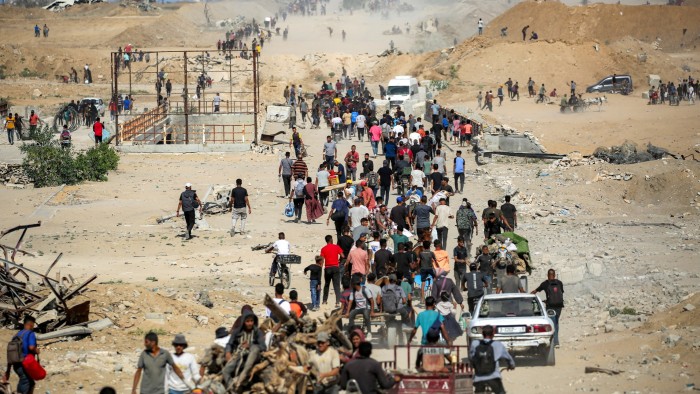Share this @internewscast.com
Unlock the Editor’s Digest for free
Tens of thousands of Palestinians returned to Gaza City on Friday, making their way north along the enclave’s coastal road following the Israeli military’s announcement of a ceasefire with Hamas.
These individuals, many of whom were displaced just last month due to Israeli air strikes and a ground incursion, traveled on foot. They represented a wave of people seeking to reclaim their disrupted lives with the hope that this truce signifies the conclusion of the two-year conflict.
The majority were men who ventured alone to assess the livability of their homes, preparing to retrieve wives, children, and elderly parents who had been enduring overcrowded and dire conditions in the south.
For Palestinians who have faced 24 months of bombardment, terror, hunger, and uprooting, the ceasefire was a mixed blessing. While it offered relief, the joy was tempered by sadness over the cities reduced to rubble, with scarcely anything left intact.
Othman, an engineering graduate, was among those marching. He arrived in the wreckage of Gaza City’s northern al-Nasr neighborhood to discover that his home, abandoned three weeks earlier, had been demolished.
“I only found destruction. No house and no street,” said Othman, whose family had previously repaired parts of their home this year following damage from earlier in the war.
“There can be no coming back. You can’t even make out the features of the area. Who is going to rebuild all this?”

The Israeli military said on Friday that it had completed a partial withdrawal from its front lines in Gaza under the terms agreed as part of US President Donald Trump’s ceasefire agreement, opening up roads to Gaza City that had been completely encircled by the tanks and Israeli forces.
The pullback was part of the first phase of the peace plan, and triggered a 72-hour deadline for Hamas to release all Israeli hostages still held in the strip — 20 of whom are believed to be alive.
This is set to be followed by the release of nearly 2,000 Palestinian prisoners in Israeli jails, and a surge of aid into Gaza.
The second phase of the deal designed to lead to a permanent end to the war is yet to be negotiated, however, and diplomats expect this to prove a bigger challenge. This will include Hamas’s disarmament and Israel’s full withdrawal.
Palestinian hopes for an end to the war have been dashed before: many had made the long journeys home during a shortlived ceasefire in January only to be displaced again when Israel broke the truce in March, launching new waves of assaults.
Israel has bombed, bulldozed and blown up entire neighbourhoods of Gaza City and the enclave’s other urban centres. A UN assessment in August, based on satellite images, said that 78 per cent of buildings in Gaza had been destroyed or damaged.
Esraa Sami spent Friday scanning footage posted on social media by residents of Gaza City to search for glimpses of her home in the Sheikh Radwan district, which had been subject to intense Israeli bombardment.
Her mother and brother had earlier in the day set out from their tent in Zawaida, in central Gaza, to head for the city.
“The house is more precious to me than my life,” Sami, a psychology graduate, said as she awaited a message from her family. “I am very nervous because many people have arrived to find only ruins.”
Later on Friday she announced on Facebook: “The house is gone. We have become homeless . . . The last thing I had set my hopes on is gone. All I wanted was to go back home throw myself on my bed and cry.”
Others in Gaza already know they will find nothing.
Abu Aziz, from Beit Lahia north of Gaza City near the Israeli border, said his family house and the supermarket he owned were demolished early in the conflict, which was triggered by Hamas’s October 7, 2023 cross-border attack on Israel. The area remains under the control of the Israeli army.
Abu Aziz has been living with his wife and four children in a tent on the coast in Nuseirat, in central Gaza.
“We are going to stay here,” he said. “If I go back to the house it will be to look for winter clothes in the wreckage and to bring whatever wood remains in the building to use as fuel. Then as soon as it becomes possible, I will leave Gaza.”







